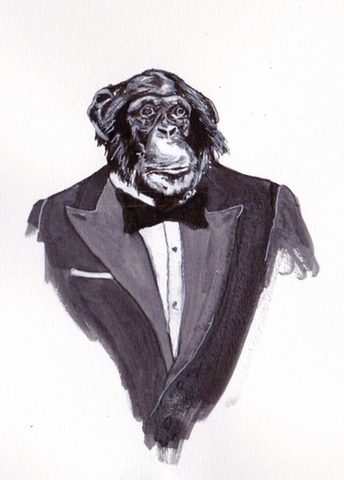Serendip is an independent site partnering with faculty at multiple colleges and universities around the world. Happy exploring!
Towards Day 22 (Mon, Nov. 26): The Lives of Animals


Red Peter
weather prediction: 44 degrees, 12 mph winds, 0% chance of precipitation, partly cloudy
Sarah Shaw is positioning us outside
what have you to say about today's weather/your relation to it....?
Smacholdt is selecting our location for Wednesday
I. coursekeeping
J.M. Coetzee' [kuut-SEE-ə ]'s philosophical novel The Lives of Animals is our text this week;
please finish reading it for Wednesday's discussion;
today we'll focus on the fictional portion, and Wed. on the four "reflections" that follow;
also by Thursday evening, instead of your usual site sit,
you should post an account of your walk w/ the frosh.
We have two more weeks of class scheduled after this one,
and we need to settle a few details:
we have agreed to share a collective ramble one day;
I think we have agreed to do this @ the
Mill Creek restoration site, in Ashbridge Park (a 10-minute walk from campus);
some of you were loathe to let go of the texts, and I had offered
to select some poetry we could discuss while walking/there;
froggies315 had proposed, an alternative, a "dynamic structure"
in which you all could pair up to share in structuring the event;
we had chosen next Sunday afternoon as the time for this, but because
the site is so close, we could do this during class time, if you'd prefer;
and an important variable here is of course the weather--right now,
50% chance of rain on Sunday, w/ fog but 0% precipitation predicted for Monday;
it's supposed to be about 50 degrees each day....).
Also on the schedule for the next two weeks is
(perhaps?) a blind field shuttle w/ Carmen Papalia
(if that doesn't happen, I can offer more poetry...);
a day discussing Timothy Morton's essay "rethinking environmental aesthetics,"
and a day devoted to a final "teach-in," in which you will share what you have
learned w/ others here (1/2 of you--eetong, graham, hira,
mturer, sarahj, srucara--need to have this explained....)
Sometime during the next 3 weeks you also need to schedule
a meeting w/ me, to discuss your final project and portfolio--
don't do this too soon (before you have an idea) or too late (after I can be helpful)!
Our decision points:
when to do our collective ramble? (& how flexible can we be about this?)
how to structure it? (what are each of our obligations?)
do we still want to do the shuttle w/ Carmen?
also to do: group yourselves for the final teach-in--
and schedule your final conference
II. Last Wednesday, we had a good discussion about
Aldo Leopold's classic essay on "The Land Ethic,"
using the strategy of "text rendering" for distilling
what he was saying, and then the game of "barometer"
for figuring out what we thought about what he said.
Today we turn to a very different text, genre-wise:
not prophetic--telling us what we need to do--but
refracted: a fictional account of a prophet that
explores the complexities of taking a stand.
Leopold's essay was "top-down"; he described the process of
"ethical evolution" as placing an increasing limitation on our freedom,
as replacing competition w/ co-operative mechanisms,
as extending the boundaries of community to include the land;
he said we need to change our loyalties, affections and convictions in
order to affirm the right of all forms of life to continued existence.
The editor/introducer of Coetzee's text is Amy Gutmann, the
political theorist who is now president of UPenn. She explains
that when Coetzee was invited to give the Tanner lectures @ Princeton
(like the Flexner Lectures Judith Butler gave here last fall...), he
substituted a fictional form for the philosophical essay that was expected;
the norm, in other words, was something like Leopold's "The Land Ethic."
At the center of Coetzee's fiction (as you know) he places a novelist,
Elizabeth Costello, who demands a radical change in the treatment of
animals, a radical sympathy for their "sensation of being." Along the way,
she makes a profound claim for fiction: it serves an ethical purpose,
in extending our sympathies, opening our hearts, in showing us
that "there are no bounds to the sympathetic imagination."
This echoes something Aldo Leopold said last Wednesday: that we can be ethical
only in relation to something we see, feel, understand, love or have faith in; also
that the "mechanism of operation" of such ethics is "social approbation"....
IV. But to get into the novel, let's start
not w/ Leopold, but w/ how it affected you:
write out on a blank sheet of paper a quotation that (for
whatever reason) you found striking, and place it in the
center of our circle. Choose a passage that you think merits
further discussion.
Pass these quotations around, in silence, and comment on them.
What do we see/are we highlighting/do we want to discuss?
V. Moving up a level of abstraction, to "form"
* what is the function of the frame tale, the son's p.o.v.?
* what is the relation between the "philosophers" and the "poets" sections?
* what are the bounds of the imagination in this text?
* what is the function of the reflective responses?
"... my subject steers clear of the right. As a child ... he has seen enough of the Afrikaner right, enough of its rant, to last him a lifetime...he has perhaps seen more of cruelty and violence than should have been allowed to a child. So as a student he moves on the fringes of the left without being part of the left. Sympathetic to the human concerns of the left, he is alienated, when the crunch comes, by its language – by all political language, in fact..." [from Doubling the Point]


